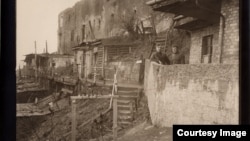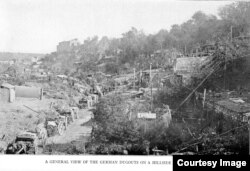Sunday, November 11, marks the 100th anniversary of the signing of the World War I armistice, when the guns fell silent across the Western Front, marking the end of a conflict that killed around 40 million people. This weekend, U.S. President Donald Trump will join dozens of other world leaders in France for events to mark the centenary.
All along the 700 kilometers of the former Western Front, smaller ceremonies are marking the 100 years since the end of the conflict that wiped out a generation of young men, traumatized a continent, and transformed the world map.
The United States entered the conflict in 1917 after declaring war on Germany. The intervention marked the beginning of America’s deep involvement in European security - but there are fears that the U.S. sacrifices are being forgotten.
Historians say American involvement came late in the war but proved vital in boosting Allied manpower and morale. On September 26, 1918, the United States army launched the Argonne offensive, led by U.S. General John J. Pershing. To this day it remains the deadliest battle in U.S. army history.
Guide and historian Randy Gaulke has been exploring the Argonne battlefields for decades.
“Essentially, in the first few days, the gains were relatively good. Not as good as General Pershing wanted, but relatively good," he said. "But then the Germans moved in reinforcements and the ability to continue to advance became much more difficult.”
The 47-day offensive recaptured hundreds of square kilometers from German forces. As French and British divisions also advanced, Germany realized defeat was inevitable and signed the armistice on November 11 1918. The guns fell silent at 11 o’clock in the morning - the eleventh hour of the eleventh day of the eleventh month.
Varennes-en-Argonne was among the first towns liberated by U.S. troops from the 35th and 28th Divisions of the Pennsylvania National Guard, to whom a monument now stands in the town. It is a place of pilgrimage for American visitors - like Alan Crane of Connecticut, part of a group of American battle re-enactors who have travelled to Europe for the centenary.
“In the United States, the First World War is really overshadowed by the Second World War. We have a saying in the United States, ‘the greatest generation’. And we use that to characterize the American veterans of the Second World War. And really, those World War I veterans just passed into the background,” says Crane.
Fellow traveler Tom Jordan of Vermont is following the trail of his ancestors who fought in the war.
“I had relatives who came over quite literally with the idea of making the world safe for democracy. They came with very high ideals.”
They were ideals that would cost over 116,000 American lives. Despite its sacrifices, America was ambivalent about any enduring role in European security in 1918, says history Professor William Philpott of Kings College London.
“In practice, America did not take the sort of role in world affairs that people had anticipated immediately after the war. It took a number of years," he said. "Europe didn’t settle down, there was more trouble between France and Germany, particularly over the question of reparations. And here it was American finance that started to play a part in international affairs.”
Two decades later, world powers would once again go to war in 1939. American military power became decisive in European security, says Philpott.
“We see it being built up to defeat fascism, but we see it being maintained thereafter because of the threat from the Eastern bloc. And although American power has changed its nature after the end of the Cold War, we still see that America has retained this capacity to project power globally and act as the world’s policeman.”
For America as a nation, that role is threatened, as rival powers seek to challenge U.S. supremacy.
For America as a people, the centenary of the Armistice offers a chance to remember the fathers and sons who never came home from a war that some fear is being forgotten.


